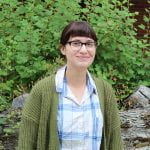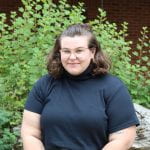By Sarah Birkle, Community Development Assistant, City of Cornelius
It began with the first meeting I was running. The Downtown Advisory Group in Cornelius consists of local business and organization leaders who have lived and worked in the city for years. As part of my service year, I am helping to find new strategies in order to help reorganize the group.
Organizing and planning the meetings was no problem. I created agendas, nameplates and documents to share and discuss. Feeling prepared, and satisfied with my organization prior to the meeting, I thought I would have no problems speaking in front of the group. However, as soon as I looked into the faces theses established business leaders who sat down one by one around the table; I lost all stream of consciousness. I was talking, but receiving blank stares; I was handing out papers, but couldn’t find the words to explain them.
In stand-up comedy terms – I bombed.
Half way through the meeting, my supervisor asked me a question to help steer the discussion into a better direction with the group. This direction helped immensely and I was thankful for the push. For the final 30 minutes, the group now somewhat re-energized, pushed through the awkwardness from before. The meeting ended with smiles and hand-shakes- but I couldn’t get rid of the feeling that I had made a complete fool of myself. After the meeting, my supervisor, spoke with me – he was not angry with me, but rather gave a motivational push.
He said, “Everyone here wants to support you- these people want to see you succeed- there is no need to feel intimidated.”

When he said this to me, I took a step back and was humbled. I realized that I had put so much pressure on myself- spent so much time overthinking, that I had lost my own personality in the process. He was right. Cornelius wants me to succeed- they see the potential for their community to grow and connect; and I am able to help provide support for their vision to come to life. Community Development, at its heart is about cultivating, sharing and hearing the stories of people from all sections of the city. These stories shape how a city can flourish and this process demonstrates how those ideas are important in shaping a city’s identity. Working in this field has allowed me to rediscover how important it is to voice your opinions because you never know how positive an influence this can be- opinions create change for the better.
Five months ago, I was struggling with many areas of my life both personally and with my job search. After graduating from university 4 years ago- I found myself lost and unsure that the field I studied was the right path. This paired with lost confidence in my abilities and quite honestly myself; I had become intimidated by authority, scared to speak my opinions and afraid to ask for help. However, after the push from that awkward first meeting, I am discovering tools to overcome the feeling of intimidation by others, to ask questions and not be afraid to ask for help.
I am finding my voice again. I may not continue working in the amazing world of community development after my year of service- but what RARE has given – what this position in Cornelius has provided- is the push to go after the career I want- the journey is just beginning- and I am looking forward to giving direction of where I want to go.
 About the author, Sarah Birkle: Sarah grew up in Saint Helens, Oregon and studied International and Intercultural Affairs at Portland State University. She has experience working in tourism, restaurants, teaching and coordinating programs. After seeing her hometown begin to revitalize, Sarah was inspired to be a part of positive change for rural communities and is excited about the growth which Cornelius has seen and will continue to develop. She hopes to learn more about the community, the residents and the great possibilities for the city in the next year. You can find her at your nearest coffee shop.
About the author, Sarah Birkle: Sarah grew up in Saint Helens, Oregon and studied International and Intercultural Affairs at Portland State University. She has experience working in tourism, restaurants, teaching and coordinating programs. After seeing her hometown begin to revitalize, Sarah was inspired to be a part of positive change for rural communities and is excited about the growth which Cornelius has seen and will continue to develop. She hopes to learn more about the community, the residents and the great possibilities for the city in the next year. You can find her at your nearest coffee shop.
Does community development work interest you? Are you looking for a life changing experience in rural Oregon? Learn more about serving with the RARE AmeriCorps Program via our website: https://rare.uoregon.edu/application-process/member-application-process



